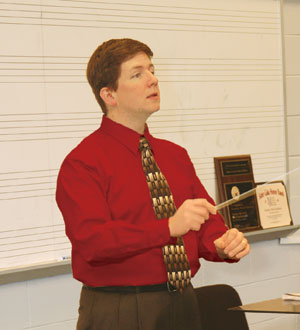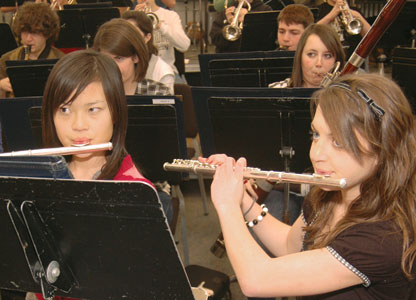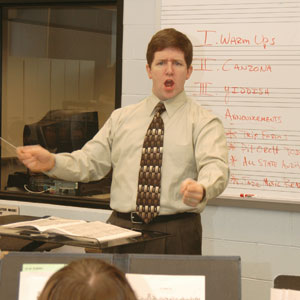 Todd Nichols and the Roxbury High School wind ensemble made history in December after becoming the first New Jersey band ever invited to the Midwest Clinic. Nichols sees the prestigious invitation as an honor not just for the school but for the entire community of Roxbury, which was named one of the 100 best for music education. In a time when powerhouse programs from the South and Midwest earn a large share of national invitations, a school from New Jersey earned the invitation of a lifetime.
Todd Nichols and the Roxbury High School wind ensemble made history in December after becoming the first New Jersey band ever invited to the Midwest Clinic. Nichols sees the prestigious invitation as an honor not just for the school but for the entire community of Roxbury, which was named one of the 100 best for music education. In a time when powerhouse programs from the South and Midwest earn a large share of national invitations, a school from New Jersey earned the invitation of a lifetime.
Your program has a team of five music teachers who teach at both the middle school and high school. How does this system operate?
There are five ensembles from 7th grade through high school, and each of the five teachers travels between the middle school and high school during the day. One day a week, the entire group goes to the elementary school to give 6th grade lessons.
We are fortunate that our school is on a traditional nine-period day with 42-minute class periods. The middle school and high school are located on the same piece of property. We teach freshman band and music theory in the morning, middle school band in the middle of the day and return to the high school for the wind ensemble and concert band, which meet simultaneously. Someday we would love to add recording technology and music appreciation classes, but the schedule is already so busy.
We do not pull students out of academic classes for any sectionals or teaching, but periodically we will ask that students be excused for a special event. Many students stay after school to practice or seek help on their music.
What are the benefits of having a team of teachers working in rehearsals instead of a single director?
One benefit is that students work with a specialist in the instrument family they play on from 7th grade through high school. For example, percussionists work with the instructor who specializes in percussion. This allows our players to progress more quickly because they get more detailed instruction than they would from someone who doesn’t play that instrument.
We are working to increase the number of students who take private lessons. Currently, about 25% receive private instruction. That number has improved in recent years but it is not nearly what we would like it to be. However, even if students do not take lessons, directors know that bad habits can be corrected in class by a specialist on that instrument.
What are the greatest difficulties to overcome with a team-teaching approach?
It takes a tremendous amount of communication between all of the instructors. The complex scheduling required to have teachers working with five different ensembles in two schools means that everyone has to be flexible. Sometimes one director will need the entire team to spend additional time working with one ensemble. During preparations for the Midwest, I needed the entire team to work with the wind ensemble for many weeks straight. That required some compromises, but the end result was worth it.

One unusual fact about the Roxbury program is that you are always recording rehearsals, sectionals, and lessons. What are the advantages of frequent recording for the program?
We have many hand-held digital recorders and the teachers decide what to record. The large rehearsal rooms are also set up with recording equipment. If we are just starting on a piece, we might not record those first rehearsals.
Later it is easy to transfer these recordings to CD or the computer. We have a listening lab where students can come to review thousands of songs. The music library has a variety of recordings, including soloists, bands, and marching bands, and this allows students to hear music that they probably wouldn’t go out and buy for themselves.
Attendance at the listening lab is voluntary, but there is steady traffic throughout the week and at times we will have 10 or 12 students in there at a time. The computers are loaded with several of the popular music software programs, and we are constantly adding more music that students would enjoy. All of our instructors place a great emphasis on producing a great sound and that comes from emulating the best sounds you can find. A friend once advised me, “Always listen to great quality recordings because your ear will be trained to hear great sound, and that is what the brain will aspire to produce.”
How has the proximity to New York City helped the Roxbury program?
Many of our teachers, including me, play in various professional jobs. This helps us develop strong contacts with studio teachers, top professional players, and teachers at local colleges. We try to bring as many people as possible out to give masterclasses for our students. The more conductors, soloists, and orchestra members who can work with students, the better.
Professional musicians can be particularly helpful in giving students a strong sense of excellent sound. I know my ear for music has developed even more in the last five years after having the opportunity to work as an assistant producer on recordings with such artists as the Keystone, Rutgers University, and Messiah College Wind Ensembles. That time in booth has really improved my listening skills. Our students enter the program with a wide range of ability levels, but our goal is to have every player produce the best sound possible. We focus quite a bit on the role of each player in the large ensemble sound.
We devote 12 to 20 minutes a day to an extensive warm-up before starting on band music. Our teachers have devised warm-ups for each instrument and also exercises for the full ensemble. Our approach to music is very slow and methodical. We do a good job of trying to maintain the composer’s intent by carefully studying how the harmony and melody fit together. Most technical problems with notes, rhythms, and tuning are addressed through sectionals held each week. This is one advantage of having five teachers available for each class. This allows us to be more deliberate in working on the music.
How important is the marching band to your program?
 Marching band is completely voluntary but remains an integral part of our efforts. We consider participation in the marching band, which meets after school, to be a privilege. There are no auditions or cuts for this group. Anyone who wants to play may do so, with the understanding that we maintain a high standard of performance and work hard. The marching band plays for all home games and several competitions each year.
Marching band is completely voluntary but remains an integral part of our efforts. We consider participation in the marching band, which meets after school, to be a privilege. There are no auditions or cuts for this group. Anyone who wants to play may do so, with the understanding that we maintain a high standard of performance and work hard. The marching band plays for all home games and several competitions each year.
The marching band is also a great recruiting tool. One game each year we invite all 8th grade band students to perform with the high school group. This gives the younger students an opportunity to learn exactly what we do in marching band and feel less scared about the move to high school. The high school students act as mentors for the new crop of students.
Having made the trip to the Midwest in December, what future goals have you set for the program?
After we came back from Chicago, we started planning our goals for the next five years. Although our bands do enter competitions, we do not spend much time talking about winning trophies. We focus on such projects as recording a CD, commissioning a new work, or attending a prestigious convention. These efforts give us a barometer to measure the program.
The thing that is special about our music program Roxbury is the strong sense of history and community support. So many community members, past directors, and alumni have really cared about this place. The previous generation built the music program up to a high level, and now the next generation is working to take the program to even greater heights. New Jersey doesn’t have the huge multi-district high schools that are common in Texas and the Midwest. Roxbury is a small place where big things happen.





